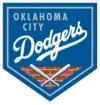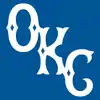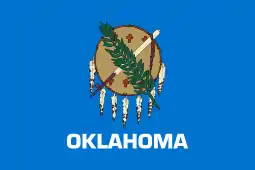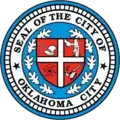Oklahoma City Dodgers
The Oklahoma City Dodgers are a Minor League Baseball team of the Pacific Coast League (PCL) and the Triple-A affiliate of the Los Angeles Dodgers. They are located in Oklahoma City, Oklahoma, and play their home games at Chickasaw Bricktown Ballpark which opened in 1998 in the city's Bricktown entertainment district.
| Oklahoma City Dodgers Founded in 1962 Oklahoma City, Oklahoma | |||||
| |||||
| Minor league affiliations | |||||
|---|---|---|---|---|---|
| Class | Triple-A (1962–present) | ||||
| League | Pacific Coast League (1998–present) | ||||
| Conference | American Conference | ||||
| Division | Southern Division | ||||
Previous leagues |
| ||||
| Major league affiliations | |||||
| Team | Los Angeles Dodgers (2015–present) | ||||
| Previous teams |
| ||||
| Minor league titles | |||||
| League titles (4) |
| ||||
| Conference titles (3) |
| ||||
| Division titles (15) |
| ||||
| Team data | |||||
| Name | Oklahoma City Dodgers (2015–present) | ||||
Previous names |
| ||||
| Colors | Dodger blue, white, red[1] | ||||
| Mascots | Brix and Brooklyn | ||||
| Ballpark | Chickasaw Bricktown Ballpark (1998–present) | ||||
Previous parks | All Sports Stadium (1962–1997) | ||||
Owner(s)/ Operator(s) | Peter Guber / Los Angeles Dodgers | ||||
| General Manager | Michael Byrnes | ||||
| Manager | Travis Barbary | ||||
The team was originally known as the Oklahoma City 89ers from 1962 to 1997 when the team played at the now-demolished All Sports Stadium at the state fairgrounds. It first competed in the Triple-A American Association (AA) in 1962, moved to the PCL from 1963 to 1968, and returned to the AA from 1969 to 1997. After the league disbanded, they rejoined the PCL in 1998 and became known as the Oklahoma RedHawks. They were called the Oklahoma City RedHawks from 2009 to 2014 before taking on the moniker of their major league affiliate in 2015.
Oklahoma City has won four league championships. The 89ers won the PCL championship in 1963 and 1965 as the Triple-A affiliate of the Houston Colt .45s/Astros. They later won the American Association championship in 1992 and 1996 with the Texas Rangers.
History
Oklahoma City has been home to professional baseball for all but a few years since 1904, when the Metropolitans (Mets) were established as the city's first team.[2] Oklahoma City's teams and names have changed numerous times since. The team became known as the Indians in 1909 before returning to the original Mets name in 1910 and reverting again to the Indians name in 1911. Oklahoma City was home to the Senators in 1912. After one year without a baseball team, Oklahoma City's squad became the Boosters in 1914. The Senators name returned from 1915 to 1916, but the Boosters name came back in 1917. The Oklahoma City Indians name returned in 1918 and the team name stuck until 1957 (the team did not compete during World War II).[3]
Oklahoma City's current baseball franchise began competing in 1962 as the Oklahoma City 89ers following a four-year period without professional baseball in the area.[4] The franchise's original name made reference to the Land Run of 1889, which led to the founding of Oklahoma City. After the Houston Buffaloes of the American Association were purchased for territorial rights by the Houston Colt .45s (later the Houston Astros) of the National League, the big league club decided to move the Buffs elsewhere. In July 1961, Spec Richardson, who was then general manager of the Buffs, met with Oklahoma City officials and boosters, and agreed to move the team.[5][6][7] After a unanimous approval from the American Association's board of directors, the current franchise began play in 1962 as the top affiliate of the Houston Colt .45s.[8] Eventually, the Astros sold the team to Tulsa businessman, P. C. Dixon, in November 1970.[9] In 1973, a three-year connection with the Cleveland Indians was established. A later affiliation with the Philadelphia Phillies lasted from 1976 until 1982.
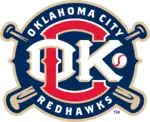
In 1983, the Texas Rangers became the parent club, a relationship that would continue as the 89ers adopted new colors and uniforms along with the nickname "RedHawks" in 1998. The city's first professional baseball name change in 35 years corresponded with the team's move to its current home, Chickasaw Bricktown Ballpark, and with the team's return to the Pacific Coast League in 1998.[10] The team was renamed the RedHawks after the red-tailed hawk, a bird of prey commonly seen throughout Oklahoma. When announcing the new name, team officials noted the raptor's four-foot wingspan and migration patterns, which always return the bird to Oklahoma. A hawk is also part of the state's official song.[11]
Prior to the 2009 season, the team once again named itself after its home city. The minor renaming was accompanied by new logos and a new color scheme.[12] The team's name change to the Oklahoma City RedHawks was made to honor Oklahoma City citizens who paid for the ballpark through a temporary one-cent sales tax to fund the Metropolitan Area Projects Plan or MAPS.[13]
On September 14, 2010, the Texas Rangers ownership announced that they were moving their Triple-A affiliation to the Round Rock Express (formerly the Astros' Triple-A affiliate).[14] On September 15, the RedHawks were sold to Mandalay Baseball Properties, which also owns or operates four other Minor League Baseball teams, and is part of the Mandalay Entertainment conglomerate chaired by entertainment industry executive Peter Guber. On September 20, Mandalay entered into a formal agreement for the RedHawks to become the Astros' new Triple-A affiliate.[15][16]
After the 2014 season, the RedHawks announced the sale of the franchise to a partnership between Mandalay Entertainment Chairman and CEO Peter Guber, other current principals of Mandalay Baseball Properties, Jason Sugarman,[17] and the Los Angeles Dodgers. As a result of the purchase agreement, the RedHawks became the Triple-A affiliate of the Dodgers in 2015 and were renamed after their parent club, becoming the Oklahoma City Dodgers.[18]
The start of the 2020 season was postponed due to the COVID-19 pandemic before ultimately being cancelled on June 30.[19][20]
Notable performances
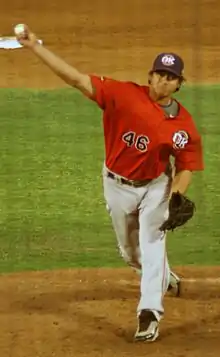
Pitchers Dustin Nippert and Luis Mendoza recorded the two no-hitters in team history (since 1998). Nippert recorded the RedHawks' first no-hitter on June 29, 2008, at Johnny Rosenblatt Stadium in Omaha, Nebraska against the Omaha Royals. The Redhawks won the seven-inning game, the first of a doubleheader, 2–0. Nippert walked two batters and struck out five in the first Oklahoma City professional baseball no-hitter since August 13, 1996, when Rick Helling recorded a perfect game for the 89ers).[21]
Mendoza pitched the team's first nine-inning no-hitter on August 14, 2009, against the Salt Lake Bees at Bricktown Ballpark. He threw 125 pitches, including 74 for strikes. He walked six and struck out six batters in the 5–0 win.|[22]
Six players have hit three home runs in a single game. Adrián González became the first to accomplish the offensive feat on May 24, 2005, at Albuquerque. He went 3-for-4 with five RBI. All three of Nelson Cruz's hits on July 19, 2008, against Memphis were home runs. He went 3-for-5 with five RBI in the game. Nate Gold went 4-for-5 with three homers and four RBI on July 28, 2008, at Colorado Springs. Chad Tracy hit three homers on June 27, 2010, against Omaha, finishing the game 3-for-3 with five RBI. Mike Hessman went 4-for-4 with three homers on June 3, 2012, against Iowa.[23] Matt Duffy went 3-for-4 with three homers and three RBI on June 9, 2014, against Salt Lake.
Gregorio Petit is the lone OKC player to record two grand slams in one game, accomplishing the feat June 22, 2010 at New Orleans. [24]
Anderson Hernandez put together the longest hitting streak in team history August 2 – September 2, 2011 – a streak that lasted 30 games. [25]
The 2013 Redhawks made numerous entries into the club's record book. The RedHawks set the team record for most runs scored in a game at Chickasaw Bricktown Ballpark and tied the club record for most runs scored in a game overall in a 24–5 win against Colorado Springs on August 3, 2013.[26]
The 2013 squad also compiled the longest overall and home winning streaks in club history. The RedHawks won 12 straight games overall from July 26 to August 6. They continued winning at home, stringing together 17 consecutive wins at Chickasaw Bricktown Ballpark from July 26 to August 20.[27]
The 2015 OKC Dodgers set a new modern era mark for wins, finishing the regular season with the best record in the PCL at 86-58 and going on to win the American Northern Division title. The last OKC team to win at least 86 games was the 1965 Oklahoma City 89ers (91-54). The 2015 team also set single-season team records for road wins (44), fewest runs allowed (608) and fewest home runs allowed (89). The team stood 30 games above .500 (85-55) during the season, marking the first time the team reached that mark in the team's modern PCL history. OKC Dodgers manager Damon Berryhill was named 2015 PCL Manager of the Year, becoming the first OKC manager to win the honor since Greg Biagini in 1999. [28]
Corey Seager became the second OKC player in the PCL era to record six hits in a game when he went 6-for-6 in Salt Lake May 28, 2015, including a home run and two doubles. Seager collected six RBI and scored two runs. Jeff Pickler was the first OKC player in the modern era to accomplish the feat June 22, 2004 at Albuquerque, going 6-for-6 with a double, triple and RBI. [29]
The 2016 OKC Dodgers claimed a second straight 80-win regular season and picked up back-to-back PCL American Northern Division championships. They advanced to the PCL Championship Series for the first time since 2008. [30]
The 2016 Dodgers posted a 3.72 team ERA to establish a new club record during the PCL era and the OKC pitching staff racked up a league-leading 1,245 strikeouts to set the PCL modern era record for strikeouts in just 141 games. The Dodgers allowed a league-low 372 walks, also the fewest allowed by an OKC team during the PCL era. Pitcher Jose De Leon became the first OKC pitcher to record five double-digit strikeout games in one season. [31]
The record-breaking continued for the OKC Dodgers in 2017. The team broke its own record for strikeouts as Dodgers pitchers combined for 1,277 strikeouts during the season. [32]
Right-handed starting pitcher Wilmer Font led the charge and paced all of Triple-A baseball with 178 strikeouts and set OKC's all-time single-season strikeout record (since 1998). He tied former Dodger Jose De Leon's club record by compiling five games with at least 10 strikeouts. Font racked up a team-record 15 strikeouts May 15 against Sacramento at Chickasaw Bricktown Ballpark and went on to be named the PCL Pitcher of the Year. [33]
The Dodgers recorded back-to-back-to-back home runs for the first time in modern team history (since 1998) June 9, 2017 against Round Rock in Oklahoma City. With one out in the first inning, Joc Pederson, Scott Van Slyke and Willie Calhoun each homered within a span of five pitches. [34]
The third-largest crowd in Chickasaw Bricktown Ballpark history was on hand to watch a rehab appearance by Los Angeles Dodgers pitcher Clayton Kershaw August 26, 2017 against the Omaha Storm Chasers. A standing-room-only crowd of 13,106 was the largest in OKC since April 18, 1998 – the third game ever played at Chickasaw Bricktown Ballpark. [35]
Season-by-season records
| League | The team's final position in the league standings |
|---|---|
| Division | The team's final position in the divisional standings |
| GB | Games behind the team that finished in first place in the division that season |
| Class champions (1962–present) | |
| League champions (1962–present) | |
| § | Conference champions (1998–present) |
| * | Division champions (1963–present) |
| ^ | Postseason berth (1962–1997) |
| Season | League | Regular season | Postseason | MLB affiliate | Ref. | ||||||
|---|---|---|---|---|---|---|---|---|---|---|---|
| Record | Win % | League | Division | GB | Record | Win % | Result | ||||
| 1962 | AA | 66–81 | .449 | 5th | — | 23 | — | — | — | Houston Colt .45s | [36] |
| 1963 * |
PCL | 84–74 | .532 | 2nd | 1st | — | 4–3 | .571 | Won Southern Division title Won PCL championship vs. Spokane Indians, 4–3[37] |
Houston Colt .45s | [38] |
| 1964 | PCL | 88–70 | .557 | 5th | 3rd | 8 | — | — | — | Houston Colt .45s | [39] |
| 1965 * |
PCL | 91–54 | .628 | 1st | 1st | — | 4–1 | .800 | Won Eastern Division title Won PCL championship vs. Portland Beavers, 4–1[40] |
Houston Astros | [41] |
| 1966 | PCL | 59–89 | .399 | 12th | 6th | 26 1⁄2 | — | — | — | Houston Astros | [42] |
| 1967 | PCL | 74–74 | .500 | 7th | 4th | 11 | — | — | — | Houston Astros | [43] |
| 1968 | PCL | 61–84 | .421 | 11th | 6th | 32 1⁄2 | — | — | — | Houston Astros | [44] |
| 1969 | AA | 62–78 | .443 | 4th (tie) | — | 23 | — | — | — | Houston Astros | [45] |
| 1970 | AA | 68–71 | .489 | 6th | 3rd | 2 | — | — | — | Houston Astros | [46] |
| 1971 | AA | 71–69 | .507 | 3rd (tie) | 2nd | 2 | — | — | — | Houston Astros | [47] |
| 1972 | AA | 57–83 | .407 | 8th | 4th | 30 | — | — | — | Houston Astros | [48] |
| 1973 | AA | 61–74 | .452 | 7th | 3rd | 7 | — | — | — | Cleveland Indians | [49] |
| 1974 | AA | 62–73 | .459 | 6th | 3rd | 14 1⁄2 | — | — | — | Cleveland Indians | [50] |
| 1975 | AA | 50–86 | .368 | 8th | 4th | 31 | — | — | — | Cleveland Indians | [51] |
| 1976 | AA | 72–63 | .533 | 3rd | 2nd | 13 1⁄2 | — | — | — | Philadelphia Phillies | [52] |
| 1977 | AA | 70–66 | .515 | 4th (tie) | 2nd (tie) | 1 | — | — | — | Philadelphia Phillies | [53] |
| 1978 | AA | 62–74 | .456 | 7th | 3rd | 4 1⁄2 | — | — | — | Philadelphia Phillies | [54] |
| 1979 * |
AA | 72–63 | .533 | 3rd | 1st | — | 2–4 | .333 | Won Western Division title Lost AA championship vs. Evansville Triplets, 4–2[55] |
Philadelphia Phillies | [56] |
| 1980 | AA | 70–65 | .519 | 3rd | 2nd | 21 1⁄2 | — | — | — | Philadelphia Phillies | [57] |
| 1981 | AA | 69–67 | .507 | 4th | 3rd | 10 | — | — | — | Philadelphia Phillies | [58] |
| 1982 | AA | 43–91 | .321 | 8th | 4th | 26 1⁄2 | — | — | — | Philadelphia Phillies | [59] |
| 1983 ^ |
AA | 66–69 | .489 | 4th | 2nd | 7 1⁄2 | 2–3 | .400 | Lost semifinals vs. Louisville Redbirds, 3–2[60] | Texas Rangers | [61] |
| 1984 | AA | 70–84 | .455 | 7th | — | 21 | — | — | — | Texas Rangers | [62] |
| 1985 * |
AA | 79–63 | .556 | 1st | 1st | — | 1–4 | .250 | Won Western Division title Lost AA championship vs. Louisville Redbirds, 4–1[63] |
Texas Rangers | [64] |
| 1986 | AA | 63–79 | .444 | 8th | 4th | 13 | — | — | — | Texas Rangers | [65] |
| 1987 ^ |
AA | 69–71 | .493 | 4th | — | 10 | 2–3 | .400 | Lost semifinals vs. Denver Zephyrs, 3–2[66] | Texas Rangers | [67] |
| 1988 | AA | 67–74 | .475 | 7th | 4th | 13 1⁄2 | — | — | — | Texas Rangers | [68] |
| 1989 | AA | 59–86 | .407 | 8th | 4th | 14 1⁄2 | — | — | — | Texas Rangers | [69] |
| 1990 | AA | 58–87 | .400 | 8th | 4th | 27 1⁄2 | — | — | — | Texas Rangers | [70] |
| 1991 | AA | 52–92 | .361 | 7th | 4th | 27 | — | — | — | Texas Rangers | [71] |
| 1992 * |
AA | 74–70 | .514 | 3rd | 1st | — | 3–0 | 1.000 | Won Western Division title Won AA championship vs. Buffalo Bisons, 3–0[72] |
Texas Rangers | [73] |
| 1993 | AA | 54–90 | .375 | 8th | 4th | 31 | — | — | — | Texas Rangers | [74] |
| 1994 | AA | 61–83 | .424 | 7th | — | 25 1⁄2 | — | — | — | Texas Rangers | [75] |
| 1995 | AA | 54–89 | .378 | 8th | — | 33 1⁄2 | — | — | — | Texas Rangers | [76] |
| 1996 ^ |
AA | 74–70 | .514 | 5th | 2nd | 5 | 6–2 | .750 | Won semifinals vs. Omaha Royals, 3–1 Won AA championship vs. Indianapolis Indians, 3–1[77] |
Texas Rangers | [78] |
| 1997 | AA | 61–82 | .427 | 6th | 3rd | 13 | — | — | — | Texas Rangers | [79] |
| 1998 | PCL | 74–70 | .514 | 9th (tie) | 2nd (tie) | 3 | — | — | — | Texas Rangers | [80] |
| 1999 * § |
PCL | 83–59 | .585 | 2nd | 1st | — | 4–4 | .500 | Won American Conference Eastern Division title Won American Conference title vs. Omaha Golden Spikes, 3–1 Lost PCL championship vs. Vancouver Canadians, 3–1[81] |
Texas Rangers | [82] |
| 2000 | PCL | 69–74 | .483 | 8th | 2nd | 13 1⁄2 | — | — | — | Texas Rangers | [83] |
| 2001 | PCL | 74–69 | .517 | 6th | 2nd | 10 | — | — | — | Texas Rangers | [84] |
| 2002 * |
PCL | 75–69 | .521 | 5th (tie) | 1st (tie) | — | 0–3 | .000 | Won American Conference Eastern Division title Lost American Conference title vs. Salt Lake Stingers, 3–0[85] |
Texas Rangers | [86] |
| 2003 | PCL | 70–72 | .493 | 8th (tie) | 2nd (tie) | 10 1⁄2 | — | — | — | Texas Rangers | [87] |
| 2004 * |
PCL | 81–63 | .563 | 2nd | 1st | — | 2–3 | .400 | Won American Conference Eastern Division title Lost American Conference title vs. Iowa Cubs, 3–2[88] |
Texas Rangers | [89] |
| 2005 * |
PCL | 80–63 | .559 | 1st | 1st | — | 2–3 | .400 | Won American Conference Southern Division title Lost American Conference title vs. Nashville Sounds, 3–2 |
Texas Rangers | [90] |
| 2006 | PCL | 74–70 | .514 | 7th (tie) | 2nd | 11 | — | — | — | Texas Rangers | [91] |
| 2007 | PCL | 71–72 | .497 | 10th | 3rd | 3 1⁄2 | — | — | — | Texas Rangers | [92] |
| 2008 * § |
PCL | 78–68 | .528 | 5th (tie) | 1st | — | 4–5 | .444 | Won American Conference Southern Division title Won American Conference title vs. Iowa Cubs, 3–2 Lost PCL championship vs. Sacramento River Cats, 3–1 |
Texas Rangers | [93] |
| 2009 | PCL | 69–75 | .479 | 12th | 2nd | 11 | — | — | — | Texas Rangers | [94] |
| 2010 * |
PCL | 73–70 | .510 | 8th | 1st | — | 0–3 | .000 | Won American Conference Southern Division title Lost American Conference title vs. Memphis Redbirds, 3–0 |
Texas Rangers | [95] |
| 2011 | PCL | 68–75 | .476 | 11th | 4th | 18 1⁄2 | — | — | — | Houston Astros | [96] |
| 2012 | PCL | 78–65 | .545 | 6th | 2nd | 1 1⁄2 | — | — | — | Houston Astros | [97] |
| 2013 * |
PCL | 82–62 | .569 | 1st | 1st | — | 0–3 | .000 | Won American Conference Southern Division title Lost American Conference title vs. Omaha Storm Chasers, 3–0 |
Houston Astros | [98] |
| 2014 | PCL | 74–70 | .514 | 7th (tie) | 2nd (tie) | 2 1⁄2 | — | — | — | Houston Astros | [99] |
| 2015 * |
PCL | 86–58 | .597 | 1st | 1st | — | 0–3 | .000 | Won American Conference Northern Division title Lost American Conference title vs. Round Rock Express, 3–0 |
Los Angeles Dodgers | [100] |
| 2016 * § |
PCL | 81–60 | .574 | 2nd | 1st | — | 4–5 | .444 | Won American Conference Northern Division title Won American Conference title vs. Nashville Sounds, 3–2 Lost PCL championship vs. El Paso Chihuahuas, 3–1 |
Los Angeles Dodgers | [101] |
| 2017 | PCL | 72–69 | .511 | 6th | 2nd | 10 | — | — | — | Los Angeles Dodgers | [102] |
| 2018 * |
PCL | 75–65 | .536 | 4th | 1st | — | 1–3 | .250 | Won American Conference Northern Division title Lost American Conference title vs. Memphis Redbirds, 3–1 |
Los Angeles Dodgers | [103] |
| 2019 | PCL | 62–77 | .446 | 12th | 4th | 21 1⁄2 | — | — | — | Los Angeles Dodgers | [104] |
| 2020 | PCL | Season cancelled (COVID-19 pandemic)[20] | Los Angeles Dodgers | [105] | |||||||
| Totals | — | 4,022–4,233 | .487 | — | — | — | 41–55 | .427 | — | — | — |
Notable players
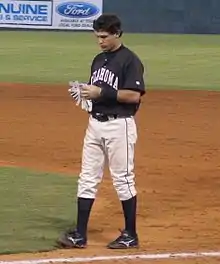
- Jim Acker, pitcher
- Cody Bellinger, outfielder/first baseman
- Hank Blalock, third baseman/first-baseman
- Steve Buechele, third baseman
- Marlon Byrd, outfielder
- Walker Buehler, pitcher
- Francisco Cordero, pitcher
- Carl Crawford, left fielder
- Nelson Cruz, outfielder
- Chris Davis, first baseman
- Doug Davis, pitcher
- R.A. Dickey, pitcher
- Justin Duchscherer, pitcher
- Scott Feldman, pitcher
- Neftalí Feliz, pitcher
- Adrián González, first baseman
- Juan González, outfielder/designated hitter
- Travis Hafner, first baseman/designated hitter
- Matt Harrison, pitcher
- Gabe Kapler, outfielder
- Dallas Keuchel, pitcher
- Ian Kinsler, second baseman
- Danny Kolb, pitcher
- Duane Kuiper, second baseman
- Gerald Laird, catcher
- Zach Lee, starting pitcher
- Ryan Ludwick, outfielder
- Rick Manning, center fielder
- J.D. Martinez, outfielder
- Mitch Moreland, first baseman/outfielder
- Max Muncy, third baseman
- Jeff Newman, catcher
- Alexi Ogando, pitcher
- Carlos Peña, first baseman
- J.R. Richard, starting pitcher
- Jarrod Saltalamacchia, catcher
- Ryne Sandberg, second baseman
- Corey Seager, shortstop
- Rubén Sierra, outfielder
- Justin Smoak, first baseman
- Sammy Sosa, outfielder
- George Springer, outfielder
- Edinson Vólquez, pitcher
- C.J. Wilson, pitcher
- Michael Young, infielder
- Josh Zeid, pitcher
Radio and broadcasters
The Oklahoma City Dodgers broadcast all their games on the radio on KGHM (AM) 1340 The Game and television live on MiLB.TV, for the 2018 season only, some select games were broadcast locally on YurView Oklahoma on Cox Cable Oklahoma channel 703 and simulcasted on Cox digital HD channels 1333 or 1334 (In case of scheduling conflicts with local High School Football.) starting in June 2018 against the Salt Lake Bees on June 15, 2018, featuring main radio broadcaster and voice of the OKC Dodgers Alex Freedman via radio play-by-play simulcast.
The current main radio voice for the Oklahoma City Dodgers is Alex Freedman (early 2012-present), Freeman started out as color commentator alongside then OKC Dodgers radio voice J.P. Shadrick at the start of the 2012 season (First couple of weeks.) but took over the main broadcast position after Shadrick stepped down to take a job with the National Football League's Jacksonville Jaguars. Fill-in Broadcaster(s) (When Alex Freedman is absent.) is or was KGHM (AM) 1340 The Game/News-radio 1000 KTOK-AM sports director Randy Renner. Current Radio color commentator: None.
The team has had multiple radio play-by-play broadcasters over the years, some of whom have advanced to the major league level.
- Curt Gowdy (late 1940s): worked as a broadcaster for the New York Yankees, Boston Red Sox, MLB on NBC, and MLB on CBS Radio; Ford C. Frick Award winner
- Bob Murphy (1949–1952): later broadcast for the Boston Red Sox, Baltimore Orioles, New York Mets, MLB on CBS Radio, and The Baseball Network; Ford C. Frick Award winner
- Dewayne Staats (1973–74): later worked for the Houston Astros, Chicago Cubs, New York Yankees, The Baseball Network, MLB on ESPN, Tampa Bay Rays, and MLB on Fox
- Mike Nail (1975-1979); He later became the voice of the Arkansas Razorbacks basketball team under coaches Eddie Sutton and Nolan Richardson
- John Rooney (1980–82): later worked for MLB on CBS Radio, Minnesota Twins, Chicago White Sox, The Baseball Network, MLB on Fox, MLB on ESPN Radio, and the St. Louis Cardinals
- Brian Barnhart (1989–94): broadcaster for the Los Angeles Angels of Anaheim, also served as a substitute Broadcaster for the Oklahoma City Blazers hockey team (1992-1993).
- Joe Simpson (1985): worked for the Seattle Mariners, Atlanta Braves, TBS Superstation, MLB on TBS
- Jack Damrill (1995-1999): Left to work as a weekend sports anker for Oklahoma City NBC affiliate KFOR-TV News Channel 4, and also worked for the University Of Oklahoma broadcasting both the Baseball and women's Basketball teams, and later worked as a Radio voice for the Oklahoma city Energy FC of the USL for their inaugural season in 2014 only.
- Jim Byers (1998 as color commentator, July 1999-2002 2004-2010 main broadcaster): Left the Redhawks in 2003 to host a local sports talk show on KREF-1400 AM in Norman, Oklahoma but returned to the team in 2004. He also worked as an announcer for Remington Park a horse racing track in Oklahoma City from (1988-early 1999), and served as a fill-in then later became a full time voice for the Oklahoma City Blazers (2005-2009), and has also worked for the Tulsa Oliers (1996-1999), the Wichita Thunder (Early 2003 as a fill-in Voice for road games only), the University of Oklahoma as broadcaster for the University's Women's basketball (2001-2002) and Men's Baseball teams (2003-early 2004), and was the voice for the American Hockey League’s Oklahoma City Barons from 2010 to 2015, when the team ceased operations. He currently works for Lone Star Park in the Dallas-Fort Worth metropolis as their track announcer (2015-present).
- Dave Garrett (2003): Former radio voice for the Dallas Cowboys (1995-1998 including Super Bowl XXX) and New Orleans Saints (1992-1993) of the National Football League, from 1986 to 1987 was sports director at WKY-AM and from 1987 to 1992 was sports talk host on sister station KTOK-AM both in Oklahoma City, and was a fill-in play-by-play broadcaster of Oklahoma State Cowboys football games and also did spot play-by-play for Oklahoma State Basketball, and worked high school championships and all-star games and Oklahoma football games on the Oklahoma News Network, he later worked for Oral Roberts University as voice for both the Men's and Women's basketball teams (1999-2004), in late 2003 Garrett was asked not to return to the Redhawks for the 2004 season in favor of bringing back former broadcaster Jim Byers, Garrett took a job with KREF-1400 AM from 2004 to 2005 (in a bit of a so-called job swap with Jim Byers.), in 2006 he returned to his old job as sports director at KTOK-AM and its new sister station KGHM (AM) 1340 The Game from 2006 to 2012, he also hosted a weekday afternoon sports show om 1340 The Game before briefly ending the show for a few months to focus on his duties as station sports director before returning the show and hosting it until he was laid off as part of nationwide layoffs at Clear Channel Communications. Garrett later became the voice for the University of Central Oklahoma Bronchos Football and Men's and Women's basketball (2007-Present), he is also currently hosting a local show called DC on the radio on KRXO-107.7 FM (2013-Present), and was the play-by-play announcer for Westwood One radio coverage of the National Football League through 2001.
- J.P. Shadrick (2011-Early April 2012): Now Part of the broadcast team for the Jacksonville Jaguars of the National Football League, hosting pregame and post game shows, occasional sideline reporter and one of the hosts of the Jaguars weekly highlight show.
Roster
| Players | Coaches/Other | |||
|
Pitchers
|
Catchers
Infielders
Outfielders
|
Manager
Coaches
| ||
See also
- Oklahoma City Dodgers players (2015–present)
- Oklahoma City RedHawks players (2009–2014)
- Oklahoma RedHawks players (1998–2008)
- Oklahoma 89ers players (1962–1997)
References
- "Introducing the Oklahoma City Dodgers". OKCDodgers.com. MLB Advanced Media. December 4, 2014. Retrieved July 24, 2019.
- Rohde, John (April 12, 1998). "Back where they started". The Oklahoman. p. 106.
- Rohde, John (April 12, 1998). "Back where they started". The Oklahoman. p. 106.
- Rohde, John (April 12, 1998). "Back where they started". The Oklahoman. p. 106.
- "O.C. Might Decide AA Question Friday". Miami News Record. July 12, 1961. p. 3.
- "Oke City Seeks Pro Franchise". Lawton Constitution. July 14, 1961. p. 18.
- "Buffs' AAA Franchise Goes to Oklahoma City". Baytown Sun. July 16, 1961. p. 9.
- "Oklahoma City is Admitted to AAA Ball Loop". Miami News Record. July 18, 1961. p. 5.
- "Houston Astros Sell Ball Team". Mexia Daily News. November 12, 1970. p. 11.
- Hersom, Bob (September 9, 1997). "Bye 89ers; Hello Oklahoma RedHawks". The Oklahoman. p. 1.
- Hersom, Bob (September 9, 1997). "Bye 89ers; Hello Oklahoma RedHawks". The Oklahoman. p. 1.
- Patterson, Matt. "RedHawks to unveil new logos and colors." The Oklahoman. August 22, 2008. Retrieved on September 26, 2008.
- Patterson, Matt."New name, look for RedHawks". The Oklahoman. April 26, 2009. p. 4F.
- Cohn, Alex. "Nolan Ryan And Rangers Nab Round Rock, Houston May Relocate Triple-A Team To Nashville." SB Nation. September 14, 2010. Retrieved on September 14, 2010.
- Zachary Levine, "Astros cultivate farm system: Oklahoma City signs 2-year deal as AAA affiliate", Houston Chronicle, September 21, 2010.
- David Falcheck, "Mandalay buys Oklahoma RedHawks franchise", The Times-Tribune (Scranton) The Times-Tribune, September 23, 2010.
- "DSG TAG".
- "RedHawks Announce Sale of Franchise". September 17, 2014. Retrieved September 17, 2014.
- "A Message From Pat O'Conner". Minor League Baseball. March 13, 2020. Retrieved May 5, 2020.
- "2020 Minor League Baseball Season Shelved". Minor League Baseball. June 30, 2020. Retrieved July 1, 2020.
- Wild, Danny (June 29, 2008). "RedHawks' Nippert Tosses No-hitter". Minor League Baseball. Retrieved August 12, 2015.
- Kelley, Mason (August 15, 2009). "RedHawks' Mendoza No-hits Bees". Minor League Baseball. Retrieved August 12, 2015.
- Ed Godfrey, "OKC RedHawks: Mike Hessman is the RedHawks' version of Crash Davis", The Oklahoman, June 5, 2012.
- "OKC Dodgers Media Guide" (PDF).
- "OKC Dodgers Media Guide" (PDF).
- "RedHawks tie team record in 24–5 win", The Oklahoman, August 3, 2013.
- Mike Baldwin, "OKC RedHawks: RedHawks' 17-game win streak at home snapped", The Oklahoman, August 26, 2013.
- "OKC Dodgers Media Guide" (PDF).
- "OKC Dodgers Media Guide" (PDF).
- "OKC Dodgers Media Guide" (PDF).
- "OKC Dodgers Media Guide" (PDF).
- "2017 PCL Stats".
- "Font Names to All-PCL Team".
- "Calhoun caps back-to-back-to-back homers".
- "Kershaw Dominates as OKC Dodgers Held Scoreless".
- "1962 American Association". Baseball-Reference. Sports Reference. Retrieved May 30, 2020.
- "1963 Pacific Coast League Standings". Stats Crew. Retrieved May 30, 2020.
- "1963 Pacific Coast League". Baseball-Reference. Sports Reference. Retrieved May 30, 2020.
- "1964 Pacific Coast League". Baseball-Reference. Sports Reference. Retrieved May 30, 2020.
- "1965 Pacific Coast League Standings". Stats Crew. Retrieved May 30, 2020.
- "1965 Pacific Coast League". Baseball-Reference. Sports Reference. Retrieved May 30, 2020.
- "1966 Pacific Coast League". Baseball-Reference. Sports Reference. Retrieved May 30, 2020.
- "1967 Pacific Coast League". Baseball-Reference. Sports Reference. Retrieved May 30, 2020.
- "1968 Pacific Coast League". Baseball-Reference. Sports Reference. Retrieved May 30, 2020.
- "1969 American Association". Baseball-Reference. Sports Reference. Retrieved May 30, 2020.
- "1970 American Association". Baseball-Reference. Sports Reference. Retrieved May 30, 2020.
- "1971 American Association". Baseball-Reference. Sports Reference. Retrieved May 30, 2020.
- "1972 American Association". Baseball-Reference. Sports Reference. Retrieved May 30, 2020.
- "1973 American Association". Baseball-Reference. Sports Reference. Retrieved May 30, 2020.
- "1974 American Association". Baseball-Reference. Sports Reference. Retrieved May 30, 2020.
- "1975 American Association". Baseball-Reference. Sports Reference. Retrieved May 30, 2020.
- "1976 American Association". Baseball-Reference. Sports Reference. Retrieved May 30, 2020.
- "1977 American Association". Baseball-Reference. Sports Reference. Retrieved May 30, 2020.
- "1978 American Association". Baseball-Reference. Sports Reference. Retrieved May 30, 2020.
- "1979 American Association Standings". Stats Crew. Retrieved May 30, 2020.
- "1979 American Association". Baseball-Reference. Sports Reference. Retrieved May 30, 2020.
- "1980 American Association". Baseball-Reference. Sports Reference. Retrieved May 30, 2020.
- "1981 American Association". Baseball-Reference. Sports Reference. Retrieved May 30, 2020.
- "1982 American Association". Baseball-Reference. Sports Reference. Retrieved May 30, 2020.
- "1983 American Association Standings". Stats Crew. Retrieved May 30, 2020.
- "1983 American Association". Baseball-Reference. Sports Reference. Retrieved May 30, 2020.
- "1984 American Association". Baseball-Reference. Sports Reference. Retrieved May 30, 2020.
- "1985 American Association Standings". Stats Crew. Retrieved May 30, 2020.
- "1985 American Association". Baseball-Reference. Sports Reference. Retrieved May 30, 2020.
- "1986 American Association". Baseball-Reference. Sports Reference. Retrieved May 30, 2020.
- "1987 American Association Standings". Stats Crew. Retrieved May 30, 2020.
- "1987 American Association". Baseball-Reference. Sports Reference. Retrieved May 30, 2020.
- "1988 American Association". Baseball-Reference. Sports Reference. Retrieved May 30, 2020.
- "1989 American Association". Baseball-Reference. Sports Reference. Retrieved May 30, 2020.
- "1990 American Association". Baseball-Reference. Sports Reference. Retrieved May 30, 2020.
- "1991 American Association". Baseball-Reference. Sports Reference. Retrieved May 30, 2020.
- "1992 American Association Standings". Stats Crew. Retrieved May 30, 2020.
- "1992 American Association". Baseball-Reference. Sports Reference. Retrieved May 30, 2020.
- "1993 American Association". Baseball-Reference. Sports Reference. Retrieved May 30, 2020.
- "1994 American Association". Baseball-Reference. Sports Reference. Retrieved May 30, 2020.
- "1995 American Association". Baseball-Reference. Sports Reference. Retrieved May 30, 2020.
- "1996 American Association Standings". Stats Crew. Retrieved May 30, 2020.
- "1996 American Association". Baseball-Reference. Sports Reference. Retrieved May 30, 2020.
- "1997 American Association". Baseball-Reference. Sports Reference. Retrieved May 30, 2020.
- "1998 Pacific Coast League". Baseball-Reference. Sports Reference. Retrieved May 30, 2020.
- "1999 Pacific Coast League Standings". Stats Crew. Retrieved May 30, 2020.
- "1999 Pacific Coast League". Baseball-Reference. Sports Reference. Retrieved May 30, 2020.
- "2000 Pacific Coast League". Baseball-Reference. Sports Reference. Retrieved May 30, 2020.
- "2001 Pacific Coast League". Baseball-Reference. Sports Reference. Retrieved May 30, 2020.
- "2002 Pacific Coast League Standings". Stats Crew. Retrieved May 30, 2020.
- "2002 Pacific Coast League". Baseball-Reference. Sports Reference. Retrieved May 30, 2020.
- "2003 Pacific Coast League". Baseball-Reference. Sports Reference. Retrieved May 30, 2020.
- "2004 Pacific Coast League Standings". Stats Crew. Retrieved May 30, 2020.
- "2004 Pacific Coast League". Baseball-Reference. Sports Reference. Retrieved May 30, 2020.
- "2005 Pacific Coast League". Baseball-Reference. Sports Reference. Retrieved May 30, 2020.
- "2006 Pacific Coast League". Baseball-Reference. Sports Reference. Retrieved May 30, 2020.
- "2007 Pacific Coast League". Baseball-Reference. Sports Reference. Retrieved May 30, 2020.
- "2008 Pacific Coast League". Baseball-Reference. Sports Reference. Retrieved May 30, 2020.
- "2009 Pacific Coast League". Baseball-Reference. Sports Reference. Retrieved May 30, 2020.
- "2010 Pacific Coast League". Baseball-Reference. Sports Reference. Retrieved May 30, 2020.
- "2011 Pacific Coast League". Baseball-Reference. Sports Reference. Retrieved May 30, 2020.
- "2012 Pacific Coast League". Baseball-Reference. Sports Reference. Retrieved May 30, 2020.
- "2013 Pacific Coast League". Baseball-Reference. Sports Reference. Retrieved May 30, 2020.
- "2014 Pacific Coast League". Baseball-Reference. Sports Reference. Retrieved May 30, 2020.
- "2015 Pacific Coast League". Baseball-Reference. Sports Reference. Retrieved May 30, 2020.
- "2016 Pacific Coast League". Baseball-Reference. Sports Reference. Retrieved May 30, 2020.
- "2017 Pacific Coast League". Baseball-Reference. Sports Reference. Retrieved May 30, 2020.
- "2018 Pacific Coast League". Baseball-Reference. Sports Reference. Retrieved May 30, 2020.
- "2019 Pacific Coast League". Baseball-Reference. Sports Reference. Retrieved May 30, 2020.
- "2020 Schedule" (PDF). Nashville Sounds. Minor League Baseball. Archived (PDF) from the original on August 5, 2020. Retrieved August 5, 2020.
External links
| Wikimedia Commons has media related to Oklahoma City Dodgers. |
| Preceded by San Diego Padres San Diego Padres |
Pacific Coast League champions 1963 1965 |
Succeeded by San Diego Padres Seattle Angels |
| Preceded by Denver Zephyrs Louisville Redbirds |
American Association champions 1992 1996 |
Succeeded by Iowa Cubs Buffalo Bisons |
